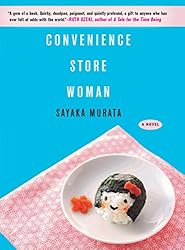Convenience Store Woman (Murata)
| Article Index | Summary | Author Bio | Book Reviews | Discussion Questions | Full Version |
|---|
Convenience Store Woman
Sayaka Murata, 2016 (2018, U.S.)
Grove Atlantic
176 pp.
ISBN-13: 9780802128256
Summary
Keiko Furukura had always been considered a strange child, and her parents always worried how she would get on in the real world.
So when she takes on a job in a convenience store while at university, they are delighted for her.
For her part, in the convenience store she finds a predictable world mandated by the store manual, which dictates how the workers should act and what they should say, and she copies her coworkers’ style of dress and speech patterns so that she can play the part of a normal person.
However, eighteen years later, at age 36, she is still in the same job, has never had a boyfriend, and has only few friends. She feels comfortable in her life, but is aware that she is not living up to society’s expectations and causing her family to worry about her.
When a similarly alienated but cynical and bitter young man comes to work in the store, he will upset Keiko’s contented stasis—but will it be for the better?
Sayaka Murata brilliantly captures the atmosphere of the familiar convenience store that is so much part of life in Japan. With some laugh-out-loud moments prompted by the disconnect between Keiko’s thoughts and those of the people around her, she provides a sharp look at Japanese society and the pressure to conform, as well as penetrating insights into the female mind.
Convenience Store Woman is a fresh, charming portrait of an unforgettable heroine that recalls Banana Yoshimoto, Han Kang, and Amélie. (From the publisher.)
Author Bio
• Birth—August 14, 1979
• Where—Inzai, Chiba Prefecture, Japan
• Education—Tamawaga University
• Awards—Akutagawa Prize (more below)
• Currently—lives in Tokyo, Japan
Sayaka Murata is one of Japan’s most exciting contemporary writers. She has worked for 18 years in a convenience store, which was the inspiration to write Convenience Store Woman, her English-language debut and winner of one of Japan’s most prestigious literary prizes, the Akutagawa Prize.
She was named a Freeman’s "Future of New Writing" author, and her work has appeared in Granta and elsewhere. In 2016, Vogue Japan selected her as a Woman of the Year. (From the publisher.)
Awards
2016 - Akutagawa Prize
2013 - Mishima Yukio Prize
2009 - Noma Literary Prize
2003 - Gunzo Prize for New Writers
Book Reviews
(Starred review) Murata’s smart and sly novel …is a critique of the expectations and restrictions placed on single women in their 30s. This is a moving, funny, and unsettling story about how to be a “functioning adult” in today’s world.
Publishers Weekly
[Murata…uses the characters of Keiko and Shiraha to deliver a thought-provoking commentary on the meaning of conforming to the expectations of society. While Murata’s novel focuses on life in Japanese culture, her storytelling will resonate with all people and experiences.
Library Journal
(Starred review) Murata, herself a part-time "convenience store woman," makes a dazzling English-language debut… rich in scathingly entertaining observations on identity, perspective, and the suffocating hypocrisy of "normal" society.
Booklist
A sly take on modern work culture and social conformism.… Murata provides deceptively sharp commentary on the narrow social slots people—particularly women—are expected to occupy…. A unique and unexpectedly revealing English language debut.
Kirkus Reviews
Discussion Questions
We'll add publisher questions if and when they're available; in the meantime, use our LitLovers talking points to help start a discussion for CONVENIENCE STORE WOMAN … then take off on your own:
1. Describe Keiko Furukura. Talk about the various aspects of her behavior that make her an oddball.
2. In what way does Keiko view Small Mart as an almost-utopia. How does her job there lend purpose to her life? Consider, for example, the manual that prescribes how she is to conduct herself with customers. How does she think of her fellow employees?
3. (Follow-up to Question 3) What does it suggest about Keiko's internal life (her soul, her personality) that she can "hear the store's voice telling what it wanted, how it wanted to be." She goes on to say, " I understood it perfectly." What does she mean that she understands the store "perfectly."
4. What is Keiko's relationship with Shiraha? What do you think of him, especially his lectures on the Stone Age—about the men who hunt and those who don't.
5. When Shiraha complains about the convenience store job, Keiko tells him, "Shiraha, we’re in the twenty-first century! Here in the convenience store we’re not men and women. We’re all store workers." What do you think of that statement? What do you think she means by it?
6. What in Japanese society is Convenience Store Woman taking aim at? Does the satire have relevance to our own culture? How would you describe the author's attitude toward Keiko? Is it one of condescension, disapproval, acceptance, admiration? Or does Murato view her heroine in a neutral fashion?
(Questions by LitLovers. Please feel free to use them, online and off, with attribution. Thanks.)
Site by BOOM
![]()
LitLovers © 2024


